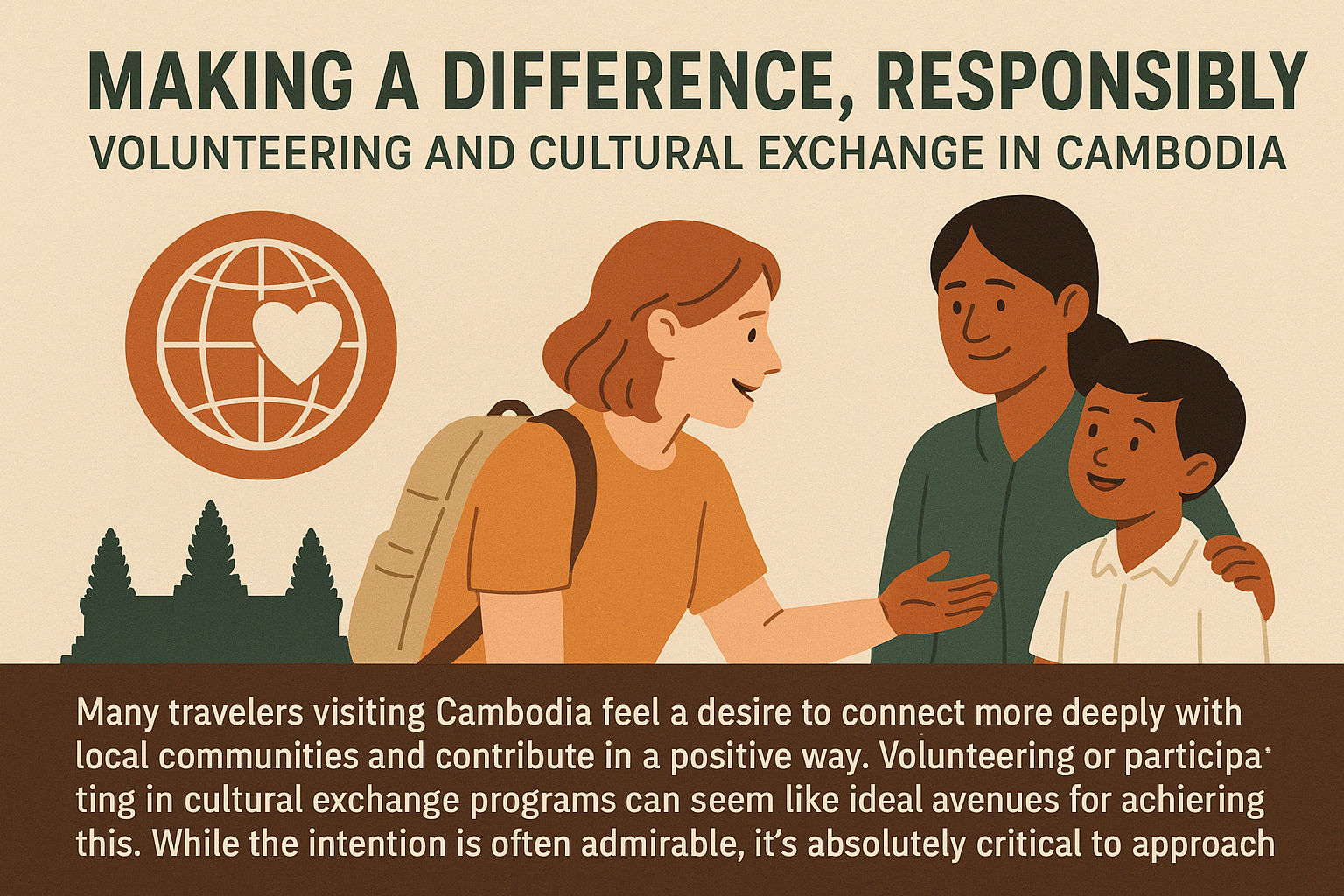Cambodia, with its stunning temples, rich culture, vibrant cities, and beautiful landscapes, offers travelers countless incredible experiences. As visitors, we have the opportunity – and responsibility – to ensure our presence benefits the local communities and minimizes negative impacts on the environment and culture. Practicing responsible and sustainable tourism isn’t just about being ‘good’; it leads to more authentic interactions, deeper connections, and helps preserve the magic of Cambodia for future generations and its own people.
1. Support Local, Empower Communities
One of the most impactful ways to travel responsibly is to ensure your tourist dollars directly benefit local Cambodians:
- Choose Local Accommodation: Opt for locally owned guesthouses, boutique hotels, or homestays (see Article 15.2) instead of large international chains whenever possible. This keeps profits within the community.
- Eat Local: Dine at locally owned restaurants and street food stalls (see Article 15.7). This supports local families and farmers.
- Hire Local Guides & Drivers: Employ licensed local guides for temple tours or city explorations, and use local tuk-tuk or taxi drivers. Their knowledge enhances your experience, and the income supports them directly.
- Buy Local Products: Purchase souvenirs and handicrafts directly from artisans, local markets (see Article 15.3), or shops known for supporting Cambodian producers. Look for items genuinely made in Cambodia.
2. Wildlife Encounters: Prioritizing Ethics
Cambodia is home to diverse wildlife, but tourism involving animals requires careful ethical consideration:
- Reject Elephant Riding: Never ride elephants. This practice harms the animals’ spines and is often linked to cruel training methods. Support sanctuaries like the Elephant Valley Project in Mondulkiri that prioritize elephant welfare, offer no riding, and focus on observation in natural environments.
- Avoid Animal Performances: Steer clear of attractions featuring performing monkeys, bears, or other wild animals. Training often involves abuse, and these venues rarely contribute to conservation.
- Say No to Wildlife Selfies/Cuddling: Avoid places offering opportunities to hold or cuddle wild animals, especially cubs (like tiger cubs). This often supports illegal wildlife trade and involves separating young animals from their mothers.
- Research Sanctuaries Thoroughly: If visiting a wildlife rescue center or sanctuary, research its credentials, welfare standards, and conservation contributions beforehand. Look for transparency and internationally recognized affiliations if possible.
3. Treading Lightly: Minimizing Your Environmental Footprint
Help protect Cambodia’s beautiful natural environment with these practices:
- Combat Plastic Waste: Single-use plastic is a major problem. Refuse plastic bags in shops (bring your own reusable bag). Say no to plastic straws. Carry a reusable water bottle and utilize refill stations (apps like “Refill Not Landfill” can help locate them).
- Manage Your Waste: Dispose of litter responsibly in designated bins. In remote areas with limited waste management, consider packing out your non-biodegradable waste.
- Conserve Water & Energy: Be mindful of water usage (showers) and turn off lights, fans, and air conditioning when leaving your room.
- Respect Nature: When trekking or visiting natural areas (see Article 15.8), stay on marked trails, avoid disturbing wildlife or damaging plants, and leave natural sites as you found them.
4. Beyond the Crowds: Addressing Overtourism at Heritage Sites
The immense popularity of sites like Angkor Wat brings challenges:
- The Issue: Overtourism, particularly at Angkor Wat, Bayon, and Ta Prohm during peak hours and seasons, leads to intense crowding, which diminishes the visitor experience and puts physical strain on these ancient, fragile structures (wear and tear from footsteps, touching).
- How You Can Help:
- Visit Popular Temples Early/Late: Arrive at sunrise or explore late in the afternoon to avoid the largest tour groups and midday heat.
- Explore Lesser-Known Temples: Utilize your Angkor Pass to visit incredible but less crowded temples within the main park or further afield (see Article 15.9).
- Consider Off-Peak Travel: Visiting during the shoulder seasons or the green (rainy) season often means fewer crowds.
- Behave Respectfully: Never climb on unstable structures, don’t touch carvings, keep noise levels down, and always follow site regulations.
5. Community First: Engaging in Community-Based Tourism (CBT)
Actively seek out and support Community-Based Tourism initiatives. These are tourism projects planned, owned, and operated by local communities, ensuring that benefits are distributed locally and that tourism development aligns with community values and needs. Examples include:
- Homestays: Staying with local families in rural areas (e.g., Battambang, Kratie).
- Community Lodges/Guesthouses: Accommodation run by village cooperatives (e.g., Chi Phat in the Cardamoms).
- Local Guiding Services: Hiring guides directly from the community for treks, cultural tours, or nature activities.
- Community Restaurants & Craft Cooperatives: Eating at or buying from enterprises run by the community (e.g., Banteay Chhmar CBT).
6. Conscious Consumption: Sustainable Fashion and Handicrafts
Make your souvenir shopping count by supporting sustainable and ethical practices:
- Seek Authenticity & Fair Trade: Look for products genuinely made in Cambodia using traditional skills. Prioritize shops or brands known for fair wages, good working conditions, and direct support for artisans (e.g., Artisans Angkor, shops certified by fair trade organizations).
- Choose Sustainable Materials: Opt for items made from natural, local materials like silk, cotton, bamboo, or rattan, potentially using natural dyes.
- Support Preservation: Purchasing high-quality traditional crafts helps keep these skills alive (see Articles 14.6, 14.8, 15.3).
Conclusion
Traveling responsibly and sustainably in Cambodia isn’t about sacrificing enjoyment; it’s about enhancing it. By making conscious choices – supporting local economies, protecting wildlife and the environment, respecting cultural heritage, and engaging ethically with communities – visitors can ensure their journey leaves a positive impact. These choices lead to richer, more authentic experiences and contribute to the long-term well-being of the Kingdom of Wonders and its people. Let’s all strive to travel with care, curiosity, and compassion.


